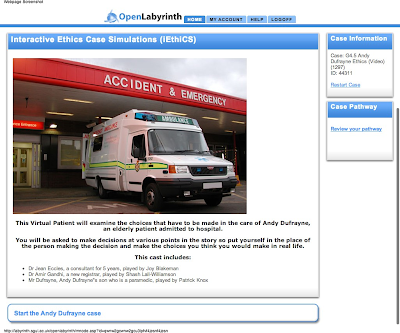Comparing resources in: Khan, Articulate, UoL
= part of Octel Activity 4.1: “Comparing resources”
Take the perspective of a learner and spend some time using:
- one resource from Khan Academy’s YouTube videos
- one resource from ElearningExamples e-learning games
- the iEthiCS simulation.
Khan Academy’s YouTube videos
This is very clear and the handwritten notes actually become the focus, though the background graphic helps hold the eye and make it look quality.
Q. What elements of these do you think are appealing to different kinds of learners?
A. They are clear to get into: their intent is clear.
Q. What kinds of learners, if any, would they be inappropriate for and why?
A. Learners who did not know how to find their level in a subject like say, Maths. However, they can experiment. If you take one of their playlists, it works well. And indeed they present a couple of such playlists on the main page, e.g. Biology or Physics.
Q. How do each of these resources differ from that of the resources we’re using in ocTEL?
A. They form a huge bank of similar resources that the person can flick through to find their entry point. Whereas ocTEL resources are different from each other in style or substance. They are also much more visual in that they are embedded in the page, whereas ocTEL are linked to.
Q. What ways can you see to improve the effectiveness or potential reach of these resources?
A. It isn’t initially clear how to see the list of other videos in a playlist (you do it by clicking the button in the top right of the video; though it may not be there, i.e. if you’re not watching a video that is sequenced within a playlist).
A resource from ElearningExamples’ e-learning games
I tried this one: http://elearningexamples.com/the-creative-mystic-the-six-personas-of-creativity/“The Creative Mystic: The Six Personas of Creativity”
Q. What elements of these do you think are appealing to different kinds of learners?
A. They are intriguing… what will this oracle uncover? Like the famous “Turk’s Head” machine. It may hook anyone who can be intrigued.
Q. What kinds of learners, if any, would they be inappropriate for and why?
A. The cynical, the impatient, the incurious.
Q. How do each of these resources differ from that of the resources we’re using in ocTEL? A. More intriguing as a contained adventure, a fortune-teller.
Q. What ways can you see to improve the effectiveness or potential reach of these resources?
A. Make them have different results for EACH different input.
Source: ElearningExamples is run by an Articulate guy http://elearningexamples.com/about/ who also still has a great personal site on e-learning at http://multimedialearning.com/
The iEthiCS simulation
Q. What elements of these do you think are appealing to different kinds of learners?
A. Great the way that it doesn’t provide the answer straight away – or indeed at all. Helps with complexity.
Here’s an example of where different choices may lead you to as conclusions, some incorrect:
- very incorrect: http://labyrinth.sgul.ac.uk/openlabyrinth/mnode.asp?id=qwnw2gcwnw2gcu3lpfvqdknamqajxhq
- still incorrect: http://labyrinth.sgul.ac.uk/openlabyrinth/mnode.asp?id=qwnw2gcwnw2gcgxlrdbqajxhqlsdn67
- finally correct: http://labyrinth.sgul.ac.uk/openlabyrinth/mnode.asp?id=qwnw2gcwnw2gcu3lpfvqdknamwnw2gc
Q. What kinds of learners, if any, would they be inappropriate for and why?
A. Those who just need a job aid, a quick clear answer.
Q. How do each of these resources differ from that of the resources we’re using in ocTEL?
A. They set up a video scenario and you follow it through, whereas we’re not consuming such scenarios.
Q. What ways can you see to improve the effectiveness or potential reach of these resources?
A. I think they’re great for effectiveness. For reach, I am unclear how they’re marketed.
Local note: this simulation is made by http://www.elu.sgul.ac.uk/ who are located in SW London:
View Larger Map
![]()


